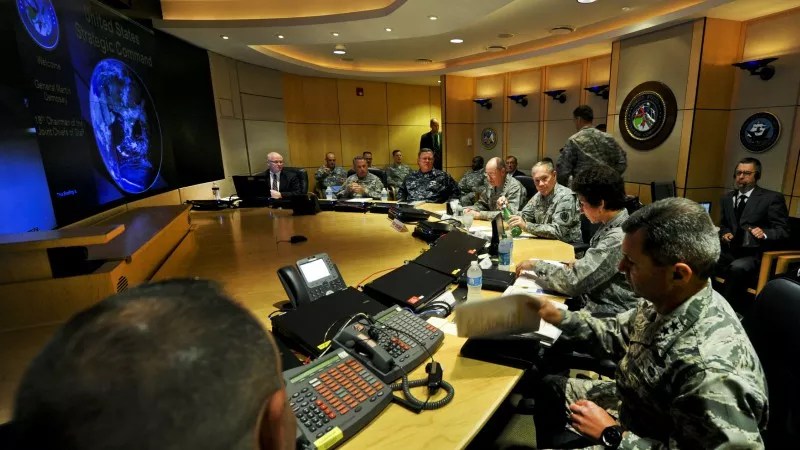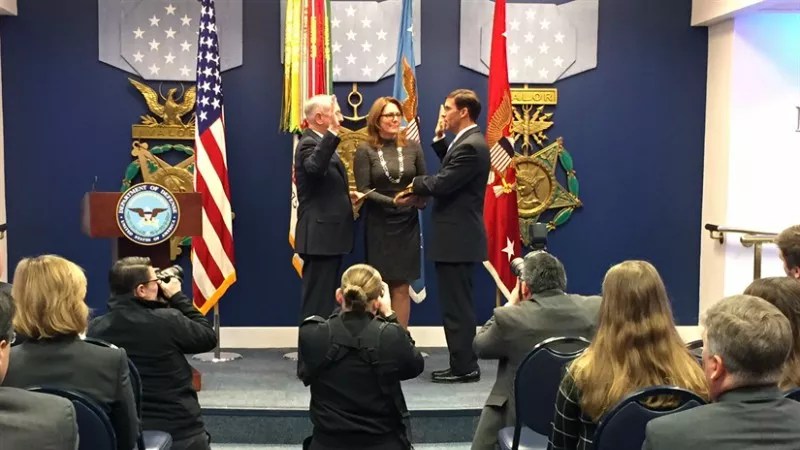
Department of Defense photo by D. Myles Cullen

Audio By Carbonatix
After Denver was named one of twenty finalists as the location for Amazon HQ2, locals already concerned about out-of-control growth and rising housing costs offered a notably mixed reaction, with a recent poll suggesting that Mile High residents are less enthusiastic about hosting a new campus for the mega-firm than those living in any of the other potential sites. But they could be more favorably disposed to Army Futures Command, a new military project that also has Denver on its short list.
One reason is Army Futures Command’s smaller scale. Whereas Amazon HQ2 is expected to create 50,000 new jobs (and bring thousands of new cars flooding onto area roads), Colonel Pat Seiber, spokesperson for the Army Futures Command task force, estimates that “the headquarters itself is going to consist of roughly 500 folks.” Moreover, the Army would like to locate in pre-existing office space rather than building a huge new operation that would put pressure on already stressed infrastructure.
And finally, the Army doesn’t plan to keep finalists waiting nearly as long as Amazon has. Army Secretary Mark Esper “has said in testimony that he would like to announce the location by late June,” Seiber points out. “That’s a pretty quick timeline.”
What’s the concept behind Army Futures Command? According to Seiber, “The Army’s taken a look at how it can best organize as it looks at the future – how do we train and equip men for future conflicts? Right now, we’ve got Training and Doctrine Command that focuses on recruiting and training, Forces Command that maintains readiness of the current force, and Materiel Command that makes sure it’s supplied. But we haven’t had a force to keep our fighting edge. And that’s the intent of this command.”
Acquisition and testing will be among the functions that could fall within Army Futures Command’s scope, Seiber reveals, “and one of the big things we want to be able to do with this headquarters is to more easily offer access to industry and academia and innovations. It may not be as convenient for folks who work within those realms to get to a military installation as it would if we were downtown or in an area where there’s an office building where they can come in. And we’re also looking at wanting to have talent that works in the headquarters – people who can be looking at doing different things with technology.”

Mark Esper being sworn in as Army Secretary by Defense Secretary James Mattis in January.
Department of Defense photo by Jim Garamone
For that reason, the Army wants to place Futures Command in a city that has a high-tech research-and-development foundation and a healthy number of colleges, universities and similar institutions, but is also the type of place where young, smart people would like to make their home. Hence the fifteen finalists: Atlanta, Austin, Boston, Chicago, Dallas, Denver, Houston, Los Angeles, Minneapolis, New York City, Philadelphia, Raleigh, San Diego, San Francisco and Seattle.
In recent weeks, the Army sent letters to the mayors of each city above, and while the office of Denver Mayor Michael Hancock didn’t make the document it received available to Westword, we’ve obtained the one directed to San Diego Mayor Kevin Faulconer; it’s accessible below. Included are the following nine questions the mayors are supposed to answer. Most of them might be asked by any business, with the notable exception of number 7, whose topic is terrorism:
1. Which geographic area would you recommend for the proposed facility? Are there areas that complement existing or planned commercial/academic technology partnerships?
2. Are there existing commercial and academic innovation/technology incubator partnerships with which the Army Futures Command could partner?
3. Do you anticipate growth in the technology community in your city in the next five to ten years? On what are you basing your assessment?
4. What current or planned transportation options are available within both the urban area where a headquarters might be located and reasonably available housing areas?
5. What sort of incentives do you have to encourage technology based innovation companies to locate in your urban area? Are there time limits on such programs?
6. How much international technology innovation commercial presence is there in your city? Do you see this as a growth area? On what specific technology areas are these foreign entities focused?
7. What is the emergency response timeline and capabilities during a suspected terrorist incident? Can you provide an average response time for EMS assets to locations within your city?
8. Are there any plans to expand airport facilities in the near-term (within the next five years)? If so, what is the nature of the expansion plan(s)?
9. What veterans outreach programs does your city have, with particular emphasis on training and education in STEM areas?
The deadline listed for packages is May 10, and according to a statement from Mayor Hancock provided to Westword last week, Denver plans to meet it. “The Army’s request is great validation of all the hard work in Denver to make our city one of the nation’s top ‘innovation eco-systems.’ It takes thoughtful collaboration and strategic investment by many to put us at the forefront of the future economy, and I’m proud to be presented with this opportunity. Denver and the state, along with our industry and education, are already working on a response to this request.”
Seiber says the presentations should “give us an idea about the level of support or interest that folks would have for hosting the Army Futures Command.” But he adds that the decision will also take into account dollars and cents.
“I can tell you that a lot of what we’re looking at is what kind of lease space is available that could support the command – who owns it, what would it cost to do some renovating, those types of things,” he emphasizes. “The Army is striving to be better stewards of taxpayer dollars, and one way of doing that is having our modernization community, science and tech all under one roof instead of being in different stovepipes. That’s what this command is going after, and we’re excited about it. And we hope these potential cities are excited about it as well, because it’s a tremendous opportunity that’s needed at a critical time.”
Plus, it’s a lot more manageable than Amazon HQ2. Click to expand or download the sample letter to San Diego Mayor Kevin Faulconer in regard to Army Futures Command.